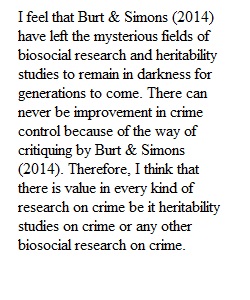


Q Biological research on crime has a rocky history in criminology and has been highly controversial. Although there have been many advances in biosocial research on crime, this controversy and debate over the value of biological research on crime is alive and well. For example, Burt and Simons published an article in 2014 in Criminology (the top journal in the field of Criminology), titled “Pulling Back the Curtain on Heritability Studies: Biosocial Criminology in the Postgenomic Era,” that provided a highly critical review of heritability studies. In their article, they offer several methodological critiques of recent heritability studies, and then they go on to conclude the following: “We have argued that there is compelling evidence that heritability studies are methodologically flawed, especially for complex social behaviors such as crime. We have argued also that heritability studies are based on an oversimplified and incorrect model of gene function and that the goal of partitioning genetic versus environmental influences on variance in phenotypes is biologically unsound. We therefore recommend an end to heritability studies in criminology. Moreover, given the many flaws in heritability studies, we also call for an end to the use of the oft-repeated version of the phrase: “We know from a wealth of behavioral genetic studies that the heritability of [insert crime or related phenotype] is roughly 50 percent.” Based on the arguments and research discussed in this article, it is apparent that we unequivocally do not know this to be the case. Furthermore, no amount of quantitative genetic research can establish the validity of such heritability estimates or their putative support for the irrelevance of shared environmental factors. Technically flawed and conceptually unsound models—no matter how often published or repeated—do not by virtue of their numbers make for sound evidence.” Drawing from the reading and lectures, write an informed response to their statement. Is there value in heritability studies and other biosocial research on crime? Should we “call for an end” to such studies? What are the potential advances and gains that could be made with biosocial research? What are the risks and rewards of conducting biosocial research? And do you think this critique offered by Burt and Simons is off-base or on-target (and what are the problems or important points of their argument)? (Note: I do not care if you agree or disagree with the quote by Burt and Simons, but you must draw from the reading/lectures to inform your response and arguments about biosocial research.) If you would like to look at the Burt and Simons paper for more detail on their study, please click here. Due by January 27.
View Related Questions